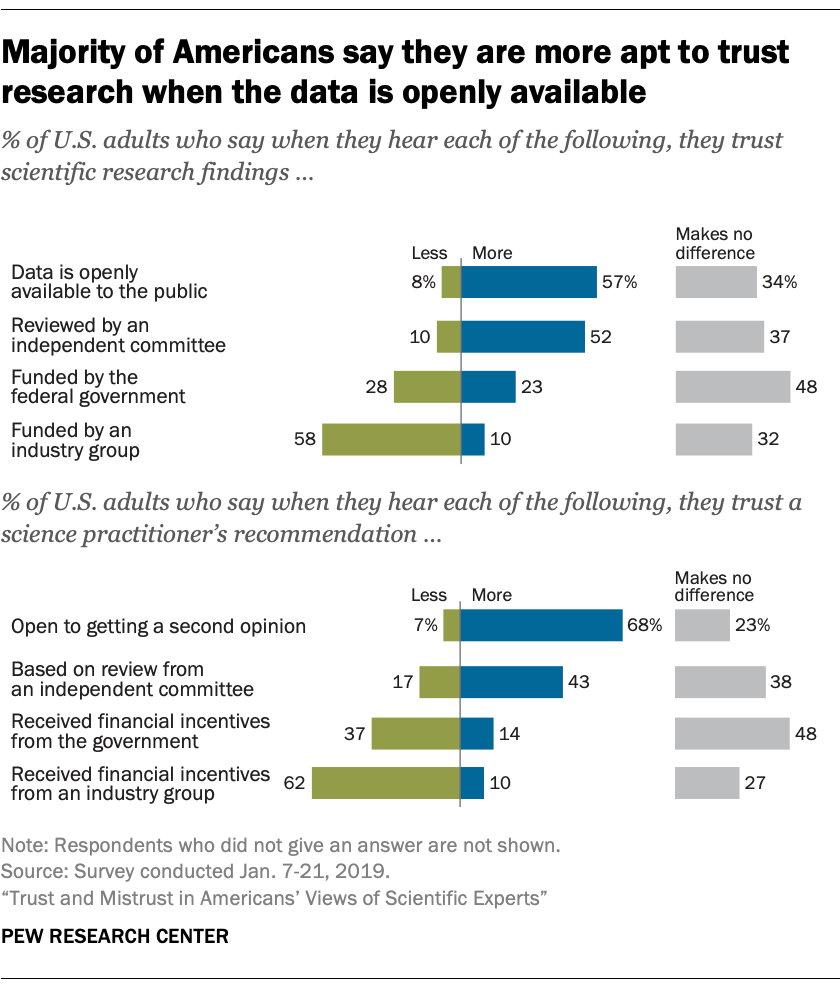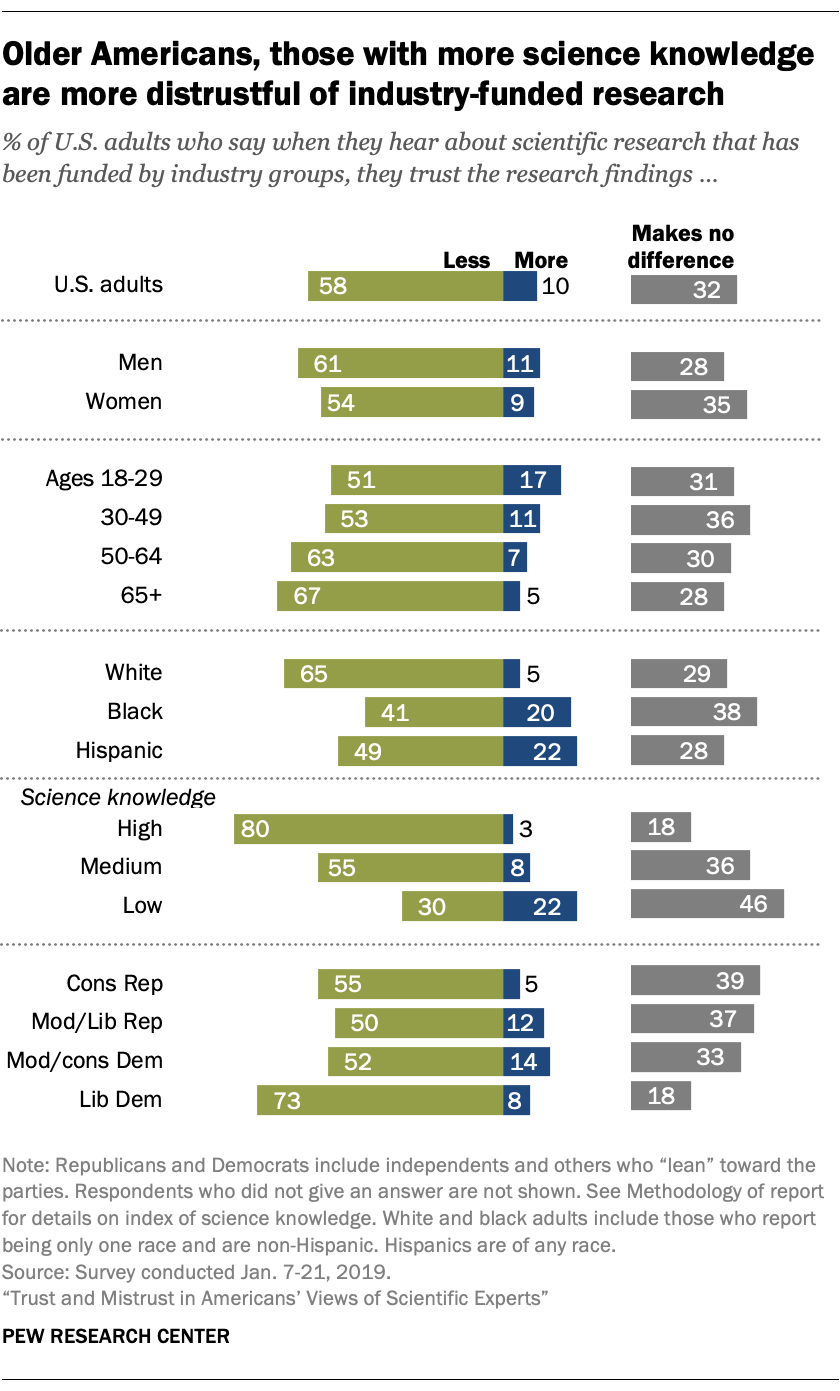A majority of Americans are skeptical of the impact that industry funding has on scientific research and on the recommendations made by practitioners, according to a recent Pew Research Center survey. The public is somewhat more positive – though still ambivalent – about the effects of government funding on research and practitioner recommendations.
 Most U.S. adults (58%) say they trust scientific research findings less if they hear that the research was funded by an industry group. About a third (32%) say industry funding makes no difference in whether they trust research, while only 10% say they trust industry-funded research findings more.
Most U.S. adults (58%) say they trust scientific research findings less if they hear that the research was funded by an industry group. About a third (32%) say industry funding makes no difference in whether they trust research, while only 10% say they trust industry-funded research findings more.
The pattern is similar when it comes to trusting science practitioners’ recommendations. Around six-in-ten Americans (62%) say they trust practitioner recommendations less when they hear the practitioner received financial incentives from an industry group. Around a quarter (27%) say such incentives make no difference; 10% say they trust practitioner recommendations more under these circumstances.
When it comes to the effects of government funding on science research and practitioner recommendations, the public is divided. About half of Americans (48%) say knowing that research received federal government funding makes no difference in whether they trust its findings. About a quarter (28%) say it makes them trust the findings less, and 23% say it makes them trust the findings more.
Similarly, 48% of U.S. adults say knowing that a science practitioner’s recommendation received financial incentives from the government makes no difference in their trust. Around four-in-ten (37%) say such incentives make them trust the recommendation less, while 14% say it makes them trust the recommendation more.
Americans are much more positive about the effects of two other factors included in the survey – open data and independent review – on the trustworthiness of research. A majority of adults (57%) say they trust research findings more when they hear the data is openly available to public, and about half (52%) say the same about research that has been reviewed by an independent committee. The pattern is similar when it comes to the trustworthiness of practitioner recommendations: A majority (68%) trusts recommendations more when the practitioner gets a second opinion, and 43% trust recommendations more if they’re based on an independent committee review.
Public skepticism about industry funding is consistent with past Pew Research Center findings. For example, a 2016 survey found Americans trusted scientists more than food industry leaders to provide full and accurate information about the health effects of eating genetically modified foods. The same survey also found that about a quarter or more of adults thought medical scientists’ research on the effects of GM foods (30%), childhood vaccines (27%) and climate change (26%) was influenced most of the time by the researchers’ desires to help the industries they work for.
Industry-funded research has been controversial in recent decades. For instance, research funded by the tobacco industry in the 1950s sought to discredit emerging science that suggested cigarette smoking caused lung disease. More recently, some scientists have been critical of industry-funded research in food science, arguing it has understated the potentially harmful effects of some food additives.
 Science knowledge is strongly related to people’s views of how industry funding affects the reliability of research findings. Those with higher levels of science knowledge are less trusting of research that has received funding from industry groups than are people with medium or low knowledge levels (80% with high science knowledge trust this research less vs. 55% and 30%, respectively).
Science knowledge is strongly related to people’s views of how industry funding affects the reliability of research findings. Those with higher levels of science knowledge are less trusting of research that has received funding from industry groups than are people with medium or low knowledge levels (80% with high science knowledge trust this research less vs. 55% and 30%, respectively).
Men are slightly more likely than women to distrust industry-funded research (61% vs. 54%, respectively), as are white Americans (65%) compared with black (41%) or Hispanic (49%) Americans. People ages 50 and older are more likely than younger adults to distrust industry-funded research findings.
Modest differences emerge between partisans. Democrats and independents who lean Democratic are more likely to distrust industry-funded research than Republicans and Republican leaners (62% vs. 53%, respectively). This difference is largely driven by the opinions of liberal Democrats, who are the most wary of industry-funded research: Nearly three-quarters (73%) say they trust research less if they know it was funded by an industry group. This compares with 52% of moderate and conservative Democrats, 55% of conservative Republicans and half of moderate and liberal Republicans.
Note: See full topline results and methodology.



